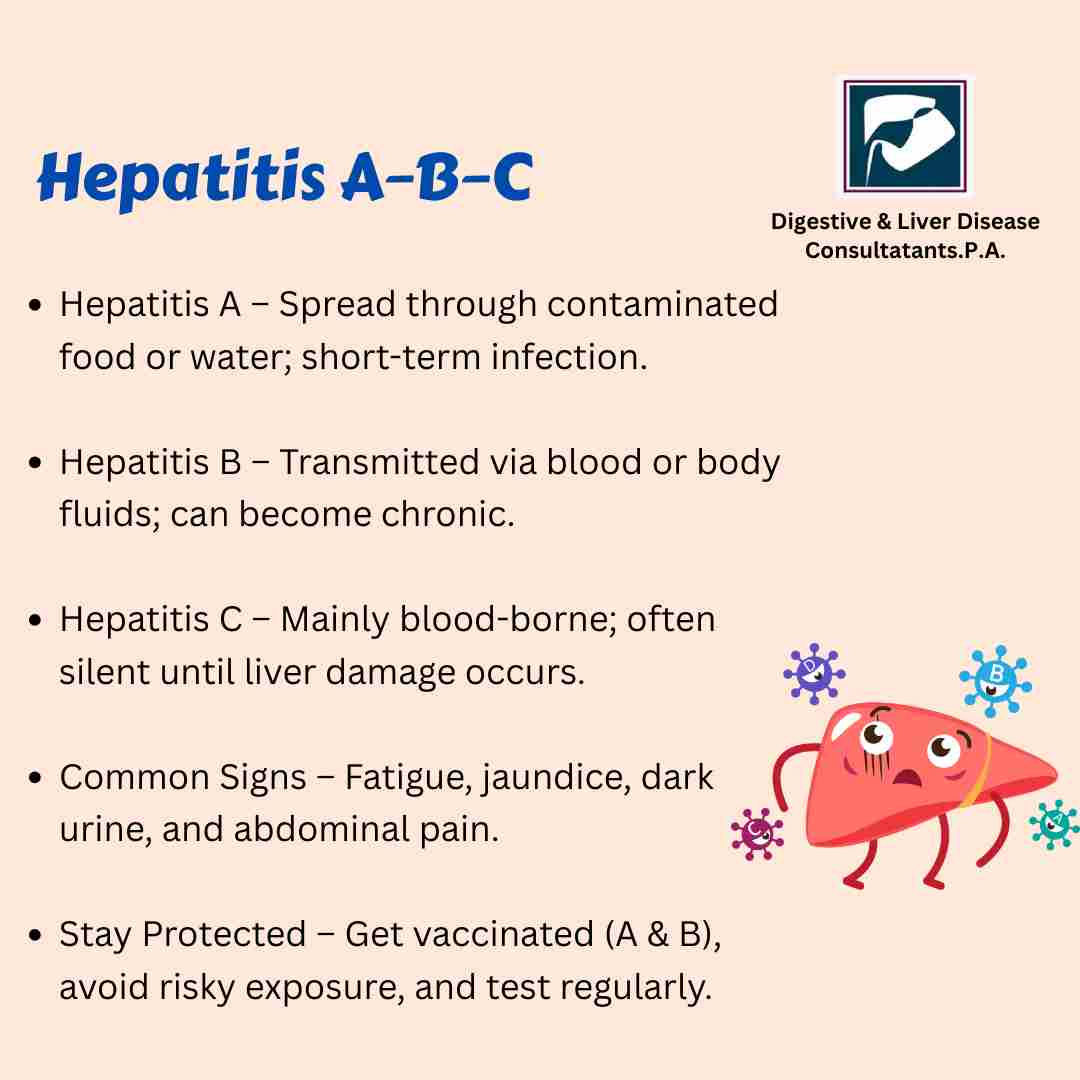The word hepatitis means inflammation of the liver. Your liver is one of the most important organs in your body—it helps digest food, store energy, and remove toxins. When the liver becomes inflamed or infected, it cannot function properly, leading to fatigue, nausea, and other health problems.
There are several types of hepatitis, but hepatitis A, B, and C are the most common. Each type is caused by a different virus and spreads in different ways. Understanding how they work and how to protect yourself can help you stay healthy and prevent serious liver diseases.
At Digestive & Liver Disease Consultants, P.A. (DLDC), we believe in making complex medical topics easy to understand. Here’s a simple guide to help you learn about hepatitis A, B, and C.
What is Hepatitis A?
Hepatitis A is a short-term liver infection caused by the hepatitis A virus (HAV). It spreads mainly through contaminated food or water, or by coming in contact with someone who has the virus.
How it spreads:
- Eating food prepared by someone who didn’t wash their hands properly
- Drinking contaminated water
- Close personal contact with an infected person
Symptoms:
- Fatigue and weakness
- Nausea or vomiting
- Abdominal pain, especially near the liver (right side of the stomach)
- Yellowing of skin or eyes (jaundice)
- Loss of appetite and dark urine
Most people recover from hepatitis A within a few weeks or months and do not develop long-term liver damage. Once you’ve had it, you’re immune for life.
Prevention:
- Get the hepatitis A vaccine
- Wash hands before eating and after using the restroom
- Avoid food or water from unsafe sources when traveling

What is Hepatitis B?
Hepatitis B is caused by the hepatitis B virus (HBV) and can be acute (short-term) or chronic (long-term). This infection spreads through contact with infected blood or body fluids, not through food or water.
How it spreads:
- Unprotected sexual contact
- Sharing needles or syringes
- From mother to baby during childbirth
- Using unsterilized medical or tattoo equipment
Symptoms:
Many people with hepatitis B don’t show symptoms at first. When symptoms occur, they may include:
- Fever and fatigue
- Joint pain
- Dark urine and pale stools
- Jaundice (yellowing of eyes and skin)
- Abdominal discomfort
Some people recover completely from acute hepatitis B, but others develop chronic hepatitis B, which can lead to cirrhosis (scarring of the liver) or liver cancer over time.
Prevention:
- Get the hepatitis B vaccine, which provides long-term protection
- Practice safe sex
- Avoid sharing personal items like razors or toothbrushes
- Use only sterilized needles or medical equipment
What is Hepatitis C?
Hepatitis C is caused by the hepatitis C virus (HCV) and is often called a “silent” infection because many people don’t know they have it until liver damage has occurred. It spreads mainly through blood-to-blood contact.
How it spreads:
- Sharing needles or syringes
- Receiving contaminated blood transfusions (rare today due to screening)
- Using unsterilized tattoo or piercing tools
- From mother to baby during birth (less common)
Symptoms:
Hepatitis C often causes no symptoms in the early stages. When they do appear, they may include:
- Fatigue
- Muscle and joint pain
- Loss of appetite
- Nausea
- Jaundice
Without treatment, chronic hepatitis C can lead to serious liver damage, cirrhosis, or liver cancer. However, the good news is that modern antiviral medications can cure hepatitis C in most cases.
Prevention:
- There is no vaccine for hepatitis C yet
- Avoid sharing needles or personal items that can come in contact with blood
- Ensure all medical and tattoo procedures use sterile equipment
Key Differences Between Hepatitis A, B, and C
| Feature | Hepatitis A | Hepatitis B | Hepatitis C |
| Type of infection | Short-term | Acute or chronic | Often chronic |
| How it spreads | Contaminated food/water | Blood, sexual contact, childbirth | Blood-to-blood contact |
| Vaccine available | Yes | Yes | No |
| Curable | Yes | Chronic cases controlled, not cured | Yes, with antiviral treatment |
| Long-term damage | Rare | Possible | Common without treatment |
Protecting Your Liver Health
The best way to protect your liver from hepatitis is through vaccination, safe hygiene, and regular medical checkups. If you have risk factors such as unprotected sex, past blood transfusions, or needle use, it’s important to get tested.
Early detection can prevent complications like liver failure or liver cancer.
Why Choose Digestive & Liver Disease Consultants, P.A.?
At Digestive & Liver Disease Consultants, P.A., we specialize in diagnosing, treating, and managing all forms of hepatitis and liver conditions. Our board-certified gastroenterologists use advanced diagnostics and personalized treatment plans to support every patient’s unique needs.
We offer:
- Expert evaluation and testing for hepatitis A, B, and C
- Advanced antiviral treatment for chronic hepatitis
- Comprehensive liver health management
- Compassionate, patient-centered care
Our mission is to help you achieve better liver health through early diagnosis, modern therapies, and lifestyle guidance.
Conclusion
Hepatitis A, B, and C may sound similar, but they differ in how they spread, how serious they are, and how they’re treated. The good news is that most types of hepatitis are preventable or treatable when diagnosed early.
If you experience symptoms such as fatigue, jaundice, or unexplained abdominal pain, or if you’re at risk due to exposure, contact a specialist as soon as possible.
At Digestive & Liver Disease Consultants, P.A., our experienced gastroenterologists are here to help you protect your liver and your health.






